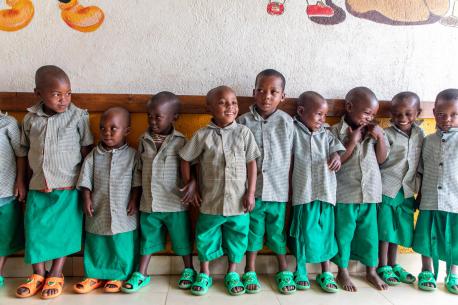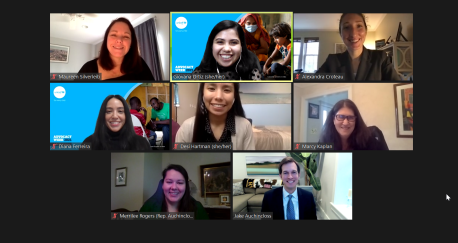
UNICEF USA Hails House Passage of Global Child Thrive Act
Advancing early childhood development in U.S. foreign assistance
UNICEF USA congratulates the U.S. House of Representatives for passing H.R. 4864, the Global Child Thrive Act, a bill that would strengthen the implementation of early childhood development in U.S. foreign assistance programs. Thanks to the leadership of Rep. Joaquin Castro (D-TX) and Rep. Brian Fitzpatrick (R-PA), the bipartisan bill passed unanimously.
Several Members of Congress spoke in support of the bill on the House floor including Rep. Castro, who had this to say: "The Global Child Thrive Act is designed to reduce the devastating effects of poverty through Early Childhood Development programming ... The benefits of ECD are particularly critical during this Coronavirus pandemic when children face severe disruptions in their development ... With so much at stake, we need to take action now."
The Global Child Thrive Act is designed to reduce the devastating effects of poverty through Early Childhood Development programming," said Rep. Joaquin Castro (D-TX). "The benefits of ECD are particularly critical during this Coronavirus pandemic when children face severe disruptions in their development ... With so much at stake, we need to take action now.
Over 80% of a baby’s brain is formed by the age of 3; the earliest years of life are the most critical for healthy brain development. Yet 250 million children under the age of 5 in low- and middle-income countries risk not reaching their development potential as a result of extreme poverty and stunting.

On September 7, schools re-opened across Cambodia, including early childhood education programs. © UNICEF/UNI369922
The COVID-19 pandemic put the world’s most vulnerable at even higher risk. Many infants and young children are unable to attend early childhood education programs or child care, adding pressure to families to balance child care and work responsibilities. This added burden on families, compounded by economic downturn and social isolation, can lead to and has caused increases in physical or emotional maltreatment, neglect, violence, mental or psychological distress, stalled educational progress and other impacts on young children. Mitigating the negative impact of COVID-19 on young children requires strategic multi-sectoral approaches that integrate and strengthen early childhood development, as called for in the Global Child Thrive Act (H.R. 4864/S.2715).

A UNICEF-supported home learning initiative in the remote southeastern Chittagong Hill Tracts (CHT) of Bangladesh has made significant progress in offsetting the effects of a country-wide education lockdown implemented because of COVID-19. Sneha, from Rangamati district, is one of 1,500 children between the ages of 3 and 5 in the CHT who have recently been supplied with a home-based learning pack. © UNICEF/UNI359533/Chakma
Since the introduction of the legislation in October 2019, UNICEF USA advocates have pushed their Members of Congress to support of this bill. Most recently, UNICEF UNITE teams spent August Recess meeting with more than 50 Congressional offices to discuss the Global Child Thrive Act and other policy priorities.
Now, UNICEF USA looks forward to working with Senator Roy Blunt (R-MO) and Senator Chris Coons (D-DE) through the remainder of 2020 to pass the Global Child Thrive Act in the U.S. Senate and ultimately have it signed into law.
Top photo: Since 2012, UNICEF has supported the Government of Rwanda to build early childhood development and care centers for children up to age 6, like these kids lining up for class in Kigali. © UNICEF/UNI316407/Houser
HOW TO HELP
There are many ways to make a difference
War, famine, poverty, natural disasters — threats to the world's children keep coming. But UNICEF won't stop working to keep children healthy and safe.
UNICEF works in over 190 countries and territories — more places than any other children's organization. UNICEF has the world's largest humanitarian warehouse and, when disaster strikes, can get supplies almost anywhere within 72 hours. Constantly innovating, always advocating for a better world for children, UNICEF works to ensure that every child can grow up healthy, educated, protected and respected.
Would you like to help give all children the opportunity to reach their full potential? There are many ways to get involved.





